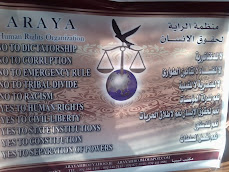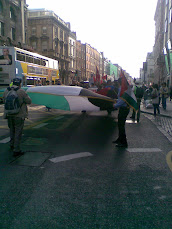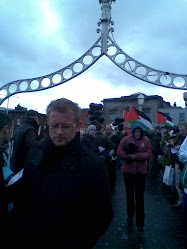
Index: MDE 12/015/2011
10 February 2011
Egypt: Human rights agenda for change
All Egyptians must be able to participate meaningfully in shaping their future. To that end, Egyptian law and practice must guarantee a level playing field for political participation, and any political transition must be accompanied by full respect for human rights and the necessary legal reforms.
After 30 years of grinding repression and economic deprivation, Egyptians have taken to the streets in unprecedented numbers to demand dignity and social justice. Protesters are calling for democratic reform; for the authorities to respect human rights; and for grievances over working and living conditions to be addressed. Any political transition must be accompanied by the dismantling of the machinery of repression and the full realization of people’s economic, social and cultural rights.
In November 1981, Amnesty International wrote to the newly appointed President Mubarak, urging him to break with his predecessor’s record of abuses – mass arrests of people for their conscientiously held beliefs; torture and other ill-treatment; and the imprisonment of individuals for non-violent, banned political activity. Amnesty International has repeated these calls to the Egyptian authorities many times since.
Thirty years on, the patterns of abuse continue. Indeed, abusive laws and practices have been written into the Constitution. Since 1981, a state of emergency has been continuously enforced to repress calls for reform. Critics of the authorities have faced arbitrary arrest and detention, prosecution on trumped-up criminal charges and unfair trials before special and military courts. Thousands of people have been labelled as a threat to security and public order to justify their arbitrary arrest and detention without charge or trial – in some cases for years. Foreign governments who see Egypt as a security partner have done little to condemn such abuses. During the US-led “war on terror”, some even relied on Egypt’s security forces to do their dirty work by sending them detainees who were then tortured to gather “intelligence”.
Egyptians’ demands for their economic, social and cultural rights have also been ignored. Workers have staged many strikes, demonstrations and sit-ins to protest against the rising cost of living, to demand better wages and working conditions, and to assert their right to organize independently. The rights of millions of people living in Egypt’s vast, sprawling and often dangerous informal settlements (slums) have been treated with contempt.
In recent weeks, security forces have continued to use excessive force to disperse demonstrators. They have stood by while demonstrators calling for reform have been attacked by pro-government supporters. The authorities have clamped down on social protests, such as unauthorized strikes by public and private sector workers. Peaceful protests must be allowed. The violence and the crackdown must end.
Amnesty International is calling on Egypt’s foreign partners, including the USA and the European Union, to condemn the ongoing repression, and to fully and unequivocally support demands for meaningful human rights reform.
The Egyptian authorities must initiate immediately a programme of human rights reform. Amnesty International’s ‘Human Rights Agenda for Change’ reflects long standing demands by Egyptian civil society. It is meant as a contribution to the formulation of a programme of reforms. Human rights change must begin now.
AMNESTY INTERNATIONAL IS CALLING ON THE EGYPTIAN AUTHORITIES TO:
End the State of Emergency: STOP arbitrary detENTIONS, torture AND UNfair trials
•Immediately lift the state of emergency and repeal all provisions of the Emergency Law. The state must not arbitrarily detain people, torture them, engage in other reprisals against them, or deny their right to fair trial. In this respect, the authorities should repeal those aspects of Article 179 of the Constitution that give sweeping powers of arrest to the security forces and allow the Egyptian President to bypass ordinary courts and refer people suspected of terrorism to military and special courts.
•Abolish the powers of the security forces to arrest and detain people incommunicado and without judicial oversight.
•Ensure that all detainees are granted access to lawyers of their own choosing, their relatives and any medical treatment that they may require.
•End blanket bans on demonstrations and public gatherings.
•Release immediately and unconditionally all prisoners of conscience – those deprived of their liberty solely for the peaceful exercise of their right to freedom of conscience, thought, opinion, expression, association or assembly.
•Enforce court orders for the release of prisoners; detainees held under administrative orders should either be released or charged with a recognizable criminal offence and tried in full conformity with international standards for fair trial and without recourse to the death penalty.
•Abolish trials of civilians before military and emergency courts. Halt immediately all trials of civilians before military courts and either release them or transfer them to civilian courts for fair trial.
•Guarantee an independent judiciary, including by ensuring that judges are not subject to arbitrary disciplinary measures, or have their judicial immunity revoked, for their activities as judges. Ensure that the Supreme Judiciary Council (the body that oversees the nomination, appointment, placement and promotion of judges) can function as an independent body, and that discriminatory restrictions preventing women from serving as judges are removed.
•Immediately make public the draft anti-terrorism law, and ensure transparent and broad-based consultation and review of the draft law, which includes civil society.
Uphold AND DEFENd the rights to freedom of expression, assembly and association
•Guarantee that all security forces, including the army, do not use excessive force when policing demonstrations and comply fully with the UN Code of Conduct for Law Enforcement Officials and the UN Basic Principles on the Use of Force and Firearms by Law Enforcement Officials.
•Open independent investigations into all cases where the security forces are reported to have used excessive force. Evidence of human rights abuses, including unlawful killings, must not be tampered with or destroyed. Investigations into killings must follow the methods set out in the UN Principles on the Effective Prevention and Investigation of Extra-legal, Arbitrary and Summary Executions. Ensure that the reports of such investigations are made public, and that those identified as responsible for human rights abuses are brought to justice in fair trials and without recourse to the death penalty.
•Publish and disseminate in a form that is readily accessible to the public the rules and regulations on the use of force by all security forces, including the army.
•Ensure that peaceful protesters are not arbitrarily arrested and detained, or tortured or ill-treated.
•Uphold the right to freedom of expression, including by protecting the freedom to seek, receive and impart information and ideas of all kinds, regardless of frontiers and through any media; and by refraining from imposing undue restrictions on internet and mobile telecommunications services.
•Repeal or amend, with a view to bringing into conformity with international law, the provisions of the Penal Code that infringe freedom of expression, in particular Articles 80(d), 98bis(b), 98(f), 102, 102bis, 171, 178, 179, 181, 188, 201 and 308, as these allow for the imprisonment of journalists and others for vaguely defined offences, such as harming “national interest” or “social peace”.
•Review Law 84 of 2002 (the Law on Associations) to enable non-governmental organizations to function without impediments such as prior authorization, funding controls and administrative dissolution under Article 42 of the Law.
•End the use of criminal defamation to punish criticism of government officials.
end torture and other ill-treatment
•Publicly condemn torture and other ill-treatment, including by instructing the security forces that these abuses will not be tolerated under any circumstances.
•Ensure that all places of detention are publicly listed and are under the oversight of judicial authorities, including military facilities and those of the State Security Investigations (SSI) department. In this respect, repeal Article 1bis of Law No. 396 of 1956 (the Law on Prison Regulations), which states that people can be held in places of detention specified in this Law as well as in places defined by decree by the Minister of Interior. In practice, this has led to detainees being held in SSI detention centres and military camps, premises that are not open to inspection by the Public Prosecutor or any other judicial authority, as required by Article 42 of the Code of Criminal Procedure and Article 85 of the Law on Prison Regulations.
•End enforced disappearances by immediately disclosing the whereabouts of all those detained, and ensure that all detainees are officially registered and their families and lawyers notified.
•Bring the crime of torture in Egyptian law in conformity with the definition in Article 1(1) of the UN Convention against Torture and Other Cruel, Inhuman or Degrading Treatment or Punishment. In particular, explicitly prohibit all forms of cruel, inhuman or degrading treatment or punishment, and make clear that the prohibition is absolute and must not be suspended under any circumstances, including during a state of war or other public emergency.
•Ensure that all allegations of torture or other ill-treatment are investigated promptly, thoroughly and impartially, that officials responsible for such abuses are brought to justice, and that victims receive full reparation. No evidence obtained using torture or other ill-treatment should be used in trials.
•Take all appropriate criminal or administrative measures against officials who fail to comply with safeguards against human rights abuses.
Prioritize the full realization of economic, social and cultural rights
•Ensure, for the whole population, minimum essential levels of economic, social and cultural rights, such as the rights to food, water, sanitation, health care and housing and, where necessary, seek international co-operation and assistance to do so.
•Ensure non-discrimination in access to essential public services, including water, sanitation and healthcare.
•Review national laws and institutions to ensure that effective remedies are available to all victims of violations of economic, social and cultural rights.
Ensure the right to AN adequate standard of living, including housing
•Immediately end all forced evictions and enforce a clear prohibition on forced evictions.
•Ensure that no evictions, including from state-owned land, are carried out until the procedural protections required under international human rights law are in place in national law and adhered to.
•Develop a comprehensive plan, consistent with Egypt’s obligations under international human rights law, to address the inadequate housing conditions leading to threats to life and health of people living in slums.
•Make public the plans for the Cairo 2050 development project, and ensure the active participation of and genuine consultation with the affected communities in developing and implementing the plans.
Uphold the right to work
•Initiate legal and institutional reforms to promote and protect labour rights, including by allowing for workers to organize freely and form independent trade unions.
•Ensure that workers are able to establish in practice trade unions that can represent them, negotiate on their behalf or allow them to bargain collectively, independently of the Egyptian Trade Union Federation and its local affiliates, which since 1957 has been mandated to be the sole trade union structure in the country.
•Set up and enforce a system to ensure a fair minimum wage so that all workers and their families are guaranteed decent living conditions. This is in line with Article 23 of the Egyptian Constitution, which states that a minimum and a maximum wage should be fixed in order to ensure less disparity in income, and with Egypt’s obligations under Article 7 of the International Covenant on Economic, Social and Cultural Rights, which stipulates that states must ensure that all workers receive, as a minimum, a fair wage.
•Amend Article 124 of the Penal Code to decriminalize peaceful exercise of the right to strike.
Protect Women’s rights
•Introduce legal provisions to protect women from domestic violence, including marital rape and sexual harassment, in compliance with Egypt’s obligations under international human rights law.
•Implement the February 2010 recommendation of the Committee on the Elimination of Discrimination against Women, which calls on the Egyptian authorities to take the necessary measures to secure the participation of women in the various phases of the electoral process.
•Comprehensively review existing and proposed legislation on personal status, ensuring that women and men have equal rights to marriage, divorce, the custody of children and inheritance, in line with Egypt’s obligations under the Convention on the Elimination of All Forms of Discrimination against Women.
•Amend Articles 260-264 of the Penal Code to allow abortion for women and girl survivors of rape and incest, or when a pregnancy poses a grave risk to the health of the woman or girl.
•Amend Law No.126 of 2008 to prohibit female genital mutilation in all cases.
ELIMINATE Discrimination
•Review, amend or abolish all laws that discriminate on the basis of race; colour; religion; ethnicity; birth; sex; sexual orientation; gender identity; political or other opinion; national or social origin; property; or other status.
•Change all laws and practices that discriminate against religious or ethnic minorities to ensure that they uphold Article 18 of the International Covenant on Civil and Political Rights, which guarantees freedom of thought, conscience and religion. Such laws include Article 98(F) of the Penal Code, which criminalizes the exploitation of religion to “disturb national peace”; Presidential Decree 291/2005, which makes repair or expansion of Christian churches subject to a permit from the regional governor; and Law 263 of 1960, which bans Baha’i activities and does not grant Baha’is legal recognition.
•Ensure that members of religious minorities, including converts, are promptly issued with up-to-date civil documents, including identification papers.
•Undertake measures to prevent sectarian attacks, and promptly and impartially investigate all reports of attacks against members of religious and ethnic minorities.
•End the arrest and prosecution of people for their real or alleged homosexuality and unconditionally release anyone imprisoned solely on the basis of their actual or imputed sexual orientation.
•Decriminalize consensual sexual relations, including by repealing Law 10 of 1961 (the Law on Debauchery) and all other legislation that criminalizes actual or alleged consensual same-sex relations.
End Violations against migrants, refugees and asylum-seekers
•Ensure that the security forces do not use force against people seeking entry to or exit from Egypt, except in strict accordance with international human rights standards, and are instructed that they may not use firearms or other lethal force except when this is strictly necessary to protect their own lives or the lives of others.
•Investigate promptly, thoroughly and impartially all cases in which Egyptian border guards or other security forces have opened fire on people seeking to cross Egypt’s borders with Israel or other countries, to bring to justice those responsible for killings or other excessive use of force, and to provide reparation to those whose rights have been violated.
•Allow asylum-seekers meaningful access to asylum procedures and to the UN refugee agency, UNHCR, and ensure that individuals who are fleeing persecution are afforded international protection.
Abolish the death penalty
•Impose an immediate moratorium on all executions.
•Commute all death sentences and review the Penal Code in order to reduce the number of capital offences, with a view to working towards abolition of capital punishment.
Co-operate with UN mechanisms
•Implement recommendations by UN treaty bodies and special procedures, and report to the Human Rights Committee, the Committee against Torture and the Committee on Economic, Social and Cultural Rights.
•Issue a standing invitation to all UN human rights experts, and facilitate immediately the visits requested by the special procedures, including the Special Rapporteur on torture, the Special Rapporteur on extrajudicial executions, the Special Rapporteur on the independence of judges and lawyers, the Special Rapporteur on the situation of human rights defenders, the Special Rapporteur on freedom of religion or belief, and the Working Group on Arbitrary Detention.
•Ratify the Rome Statute of the International Criminal Court and implement it in national law. Accede to the International Convention for the Protection of All Persons from Enforced Disappearance and implement it in national law. Accede to the Optional Protocol to the Convention against Torture and other Cruel, Inhuman or Degrading Treatment or Punishment. Ratify the optional protocols to the international covenants on Civil and Political, and Economic, Social and Cultural Rights





































































































